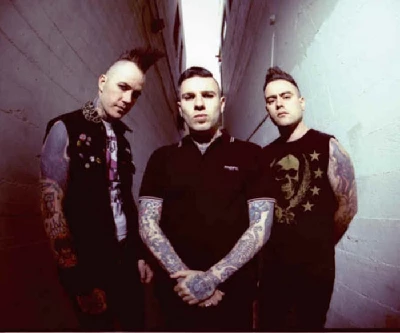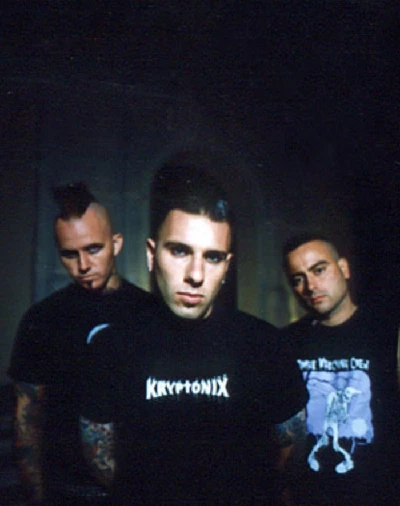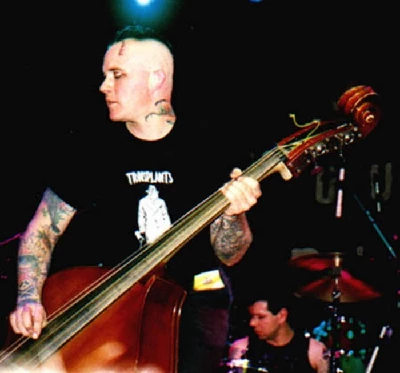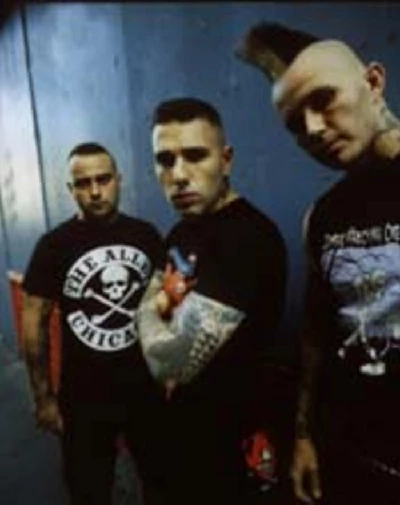published: 10 /
2 /
2005

American punks Tiger Army have had to cope with a series of disasters, including their drummer being shot. Helen Tipping speaks to frontman Nick 13 about the group's survival against the odds, and their third album 'Ghost Tigers Rise'
Article
Nick 13 isn't too impressed with the dressing room at Sheffield's Club Zero, and who can blame him - it's cold and cramped and he's sat in his coat. It's a good job that the venue is pretty good and there are lots of fans downstairs to make up for this inauspicious start.
I start by asking him how the rest of the band feel about him doing all the songwriting. Would they prefer more creative input?
N : Well, this is a relatively new line up and we've started working on a bit of new material. The people that join know that I do the songwriting. On the next album we might open it up to the other guys' input a bit more but I think people are generally comfortable with the fact that I'm the main songwriter, and perhaps that's why some people have left in the past because they were missing that sort of creative input.
PB : On the subject of the next album, how long does it normally take to record and release an album ?
N : It depends. Every album's been different, I can't say for certain that we'll be in the studio by the end of the year, but I do at least want to be the practice room with the guys by then. The last record, our third album 'Ghost Tigers Rise', took quite a while, but part of that was due to the situation with our drummer. We wound up spending a couple of weeks on drums because we were teaching them in the studio as we went along whereas normally that would take 3 - 5 days.
PB : Fred Hell, your previous drummer, is still recovering from his injuries. Do you see a time when he will be back with the band? (Fred Hell was shot during a break in at a house he was visiting during 2003)
N : I don't think so. Whether or not he's ever able to, things have changed in his life.
I get the feeling it's still a touchy subject so move on...
PB : Do you have any outside projects or work with other bands at all?
N : Not really, I was doing a bit of writing for a couple of days with AFI who are old friends of mine. Helping to come up with vocal melodies for songs they had already written. It would be an interest of mine to work with other people in terms of songwriting, not so much for Tiger Army but their projects maybe.
PB : Anyone in particular?
N : Well, I wouldn't mind writing a song or two for Morrissey, but as he doesn't play any instruments he comes up with vocal melodies. In general in terms of side projects, Tiger Army provides the outlet I need as there are so many different directions that the music can go.
PB : I've seen Tiger Army described as gothabilly or psychobilly. What would you describe it as or do you prefer not to put yourselves in a box?
N : I certainly don't have a problem with people refering to it as psychobilly, but it's always been clear from the beginning of the band that it's going to go in the direction we want it to, whether or not that fits with anyone else's idea of what the music should or shouldn't sound like. Certainly it's a bit difficult to explain. You can't just play anything and say that's psychobilly. In a certain way, as long as you're maintaining some kind of contact with the roots, I don't think there are many true limits to the influences you can bring in and make that work with the music's original spirit - I guess I do tend to take a progressive view of it.
PB : Reading a review of 'Ghost Tigers Rise' a lot of people making comments about it felt that you had sold out because it was slower than previous albums. How do you feel about that sort of comment when people aren't really moving on with you?
N : You know, it's a bit ridiculous but I think anytime you make an album that sounds a bit different to the previous album there are always people who won't come along with you because they want what they've had before.
PB : It's a bit sad really...
N : Yeah, I think some of those people eventually wind up realising after they've got used to the idea what the album is rather than what they expected it to be. Sometimes it grows on people but if it doesn't I'm not terribly concerned because people who do like the music are drawn to it. I guess as an artist I'm always going to make the record that I want to make. Certainly it's not as though we have any major mainstream popularity. I suppose what people don't realise is that you can be a sell out and make a fast record because you think that's what your fan base want to hear, but for me I'm going to make the music that means something to me and that I enjoy. I think that people who are really connecting with what we're doing will appreciate that rather than us simply going through the motions rather than play something that you want to play.
PB : How do you feel about the American radio stations' preoccupation with the mainstream?
N : The state of radio in the States is really rather sad right now. There have certainly been times throughout history where good music has been played on the radio, certainly within my lifetime,and I suppose there are times when it's been worse than it is right now as well, but it's still pretty dismal I have to say. A lot of it's tied up in politics with the FCC and whoever or whichever regime is in place. There's a lot of things going on in regards to free speech in the States as those in power tend to take an increasingly religious and increasingly narrow view of what and isn't appropriate.
PB : My friend was over recently and found people were getting increasingly paranoid. Do you find that?
N : In what sense?
PB : Hardly any eye contact in the street..
N : I think that does tend to be the culture in the States a bit, for a number of reasons but particularly involving guns. You tend to not bother people in the States and people tend to not bother you unless you are prepared to take it to an extreme level. Whereas you may have trouble on the streets in Britain and you might get a kicking from one or two people, anyone in the streets in the US can be carrying a gun, so I think people just tend to avoid each other in general. They are aware of the consequences, whereas I think maybe because of that the streets in Britain are a lot more aggressive, not that there's not aggression in the States, but if people are looking for trouble they might find more than they bargained for because someone might shoot you.
PB : After this tour are you intending to do any major European festivals in the summer?
N : That's definitely something you could see - we're still planning the summer. We do our first ever tour in Australia in March which I'm excited about as I've never been there and not many people I know have been there. A few bands have toured. That will be exciting, and then we have a full headlining tour in the States in April or May.I'd like to come back here as well.
PB : Is there anyone you'd like to tour with in the future. Do you have a say in that?
N : Yeah, we have a say as far as yes or no, but as far as being offered a tour, thats up to them. I would say the main bands I'd like to tour with would be AFI which has almost happened a few times, but our schedules have been a bit off the last few years. I think it would be cool to do some dates supporting Morrissey as well.
PB : Have you ever contacted him?
N : I've seen him around in LA, but that's it.
PB : Does he know you're a big fan?
N: I don't know, I wouldn't be suprised if he's heard of us, but I don't know if he has any major knowledge of the band. Since we've done some supporting tours I'm pretty excited to be headlining now in the UK and the States in the spring.
PB : A lot of the music you like is from the 80's, and includes bands like the Cure and the Smiths. It was quite difficult for British bands to break the American market. Did you manage to get to see them. Was it easy to hear that kind of music?
N : No, in the 80's a band like the Cure in the States was quite underground. I didn't grow up in Los Angeles, but it was one of the few places in the States where that sort of thing was played on major radio stations. It was a bit more like punk over there.
With the support band starting up, I thank Nick 13 for his time and leave him to get ready.
We stay to watch Tiger Army. They're pretty good, psychobilly with a twist. At least one song I thought sounded quite like the Cure and another you could hear the influence of The Smiths. It was certainly different from the psychobilly bands I used to go and see when younger and I can see where Nick is coming from when he talks about bringing in influences and making it work within the music's spirit - I think there's room for that. As much as I like bands like the Meteors, I don't really want to go and see copycat bands - it's good to see psychobilly moving on & growing up. Part of the reason that it doesn't enter the mainstream may be it's reluctance to widen the genre or to look outside of it for influences. With bands like Tiger Army and the UK's Goldblade looking for outside influences maybe it will start to reach a wider audience, but don't expect to see either on CD:UK just yet!
Picture Gallery:-


